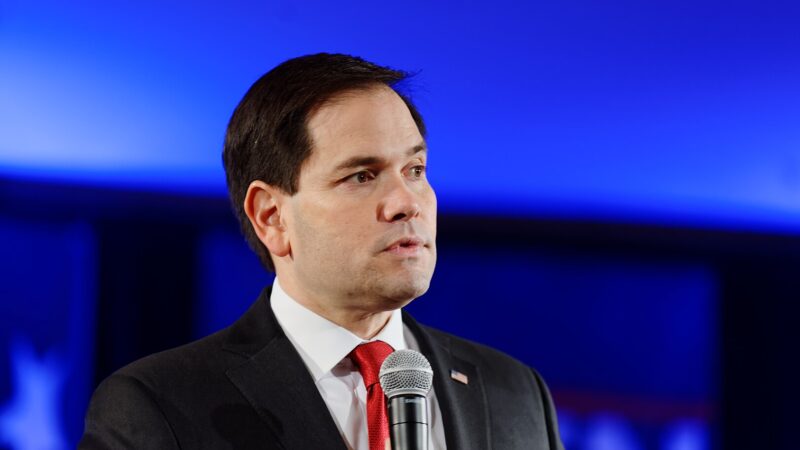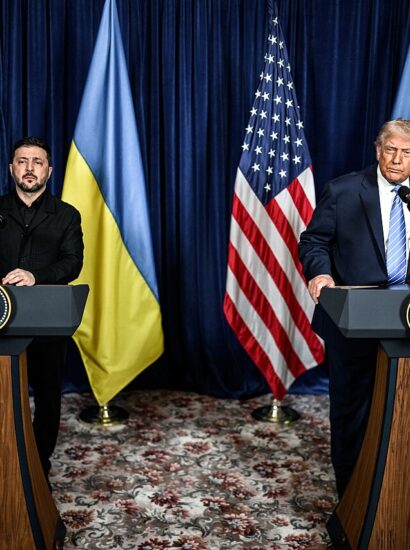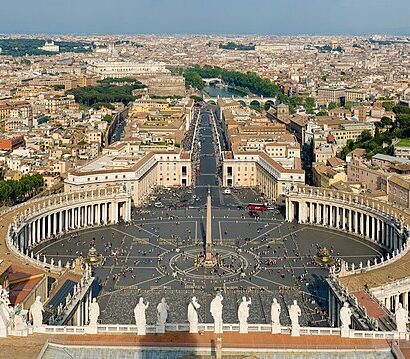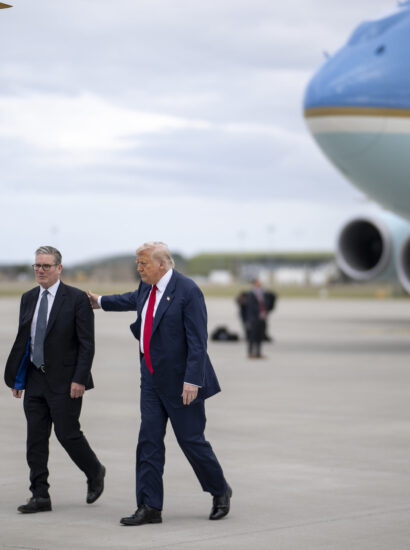Almost all of Donald Trump’s nominees for critical positions within his presidential administration have been non-traditional. Fox News presenter Pete Hegseth was just named as Trump’s possible defence secretary. Alongside Elon Musk, pharmaceutical company entrepreneur Vivek Ramaswamy has been tapped to lead a newly named Department of Government Efficiency.
With little background in border protection, South Dakota governor Kristi Noem has been nominated as the director of the Department of Homeland Security. Linda McMahon, World Wrestling Entertainment co-founder has been named Trump’s pick for secretary of commerce.
All of these people have been incredibly loyal to Trump. Few have experience of being elected and representing the public.
That makes the nomination of Florida senator Marco Rubio a little surprising. Rubio wasn’t an election denier, something that the other picks have been vocal about, and he has years of experience as a senator. Rubio also famously made fun of Trump’s hands when he was vying against him for the Republican nomination in 2016.
In Trump’s usual fashion, he responded by referring to Rubio as “Little Marco”. But these two have clearly buried the hatchet, which is unusual for Trump. Rubio ended up campaigning on behalf of Trump and became one of his biggest fans.
So what makes Rubio a surprising pick for Trump’s foreign policy leader? Rubio is seen as more of a traditional interventionist and isn’t a fan of Russia.
He called Vladimir Putin a “killer”, although within the last two years, Rubio has moderated his position.
This month, Rubio said that though he supports Ukraine, the war has to end. Rubio reasoned the US was funding a stalemate and this was no longer in Ukraine or US interests. Although he added: “That doesn’t mean that we celebrate what Vladimir Putin did or are excited about it.”
However, Rubio was also one of the Republicans who voted against the Ukraine aid bill in April 2024. It is likely that Rubio will support Trump’s desire to make a deal with Russia, that would involve Ukraine capitulating and giving up significant territory.
Rubio on NATO
While Rubio has clearly changed his tune on Ukraine to align with Trump, he is not in lockstep with Trump on Nato. In fact, Rubio co-sponsored legislation alongside Democratic senator Tim Kaine, that would make it more difficult for Trump to withdraw from Nato by requiring two-thirds of the Senate to ratify withdrawal.
As Trump has notoriously been critical of Nato, this is likely to be an area of disagreement between the two, but might be seen as a hopeful sign by other Nato member nations.
Trump, however, seems to be willing to look past this because he agrees with Rubio’s hawkish approach to China and Iran.
Rubio has proposed banning companies controlled by the Chinese Communist Party or the Chinese military from accessing US capital markets.
Rubio also advocated that electric cars that use Chinese technology not receive subsidies, and sponsored a law to prevent the import of Chinese products that were manufactured with forced labour.
Marco Rubio on Iran
When it comes to Iran, Rubio sees no difference between the leadership of hardliner Iranian former president Ebrahim Raisi and the more moderate current president, Masoud Pezeshkian. Rubio has advocated for tougher sanctions on Iran, and more pressure applied to curb the regime’s nuclear ambitions. A staunch supporter of Israel, Rubio has argued that Iran’s main goal is to make Israel unliveable.
If confirmed, Rubio would make history as the first Hispanic American secretary of state, and is fluent in Spanish. In Latin American politics, Trump has demonstrated blind faith in Rubio’s knowledge of the region.
During Trump’s first term, Rubio was certainly involved in US foreign policy towards Latin America, acting almost as a de facto secretary of state. Rubio worked to reverse the Obama administration’s softer stance on Cuba, and levy tougher sanctions against the Cuban military.
Rubio also was instrumental in cracking down on Venezuela. Rubio has made clear his position that Venezuela has become a “narco”state that cannot be negotiated with.
Rubio has clarified that all options should be on the table when dealing with Venezuela, and thus has not ruled out a military response to remove Venezuelan dictator Nicolas Maduro from power. Though it’s unlikely that the US would invade Venezuela, Rubio will likely advocate for much harsher sanctions against the country.
So what best characterises Rubio’s foreign policy? He definitely wants to take a tough approach towards America’s adversaries, but wouldn’t advocate military invasions.
More importantly, Rubio is very transactional. He has made his peace with changing his mind on key foreign policy issues in order to be invited into Trump’s inner circle. Rubio was willing to turn his back on Ukraine in order to more closely mirror the Maga agenda, and in return will be given free rein to direct US foreign policy in Latin America and a plum secretary of state role.
While Trump’s main foreign policy agenda is to try to enforce an “America first” agenda, where US national interests are always predominant, and be unpredictable, Rubio could bring some predictability to the role.
He might be closer in attitude to Rex Tillerson, Trump’s former secretary of state who was ousted in 2018. Tillerson claimed that Trump had almost no understanding of global events (behind closed doors Tillerson allegedly called Trump a moron). Or he might be more like former secretary of state Mike Pompeo who regularly sung Trump’s praises.
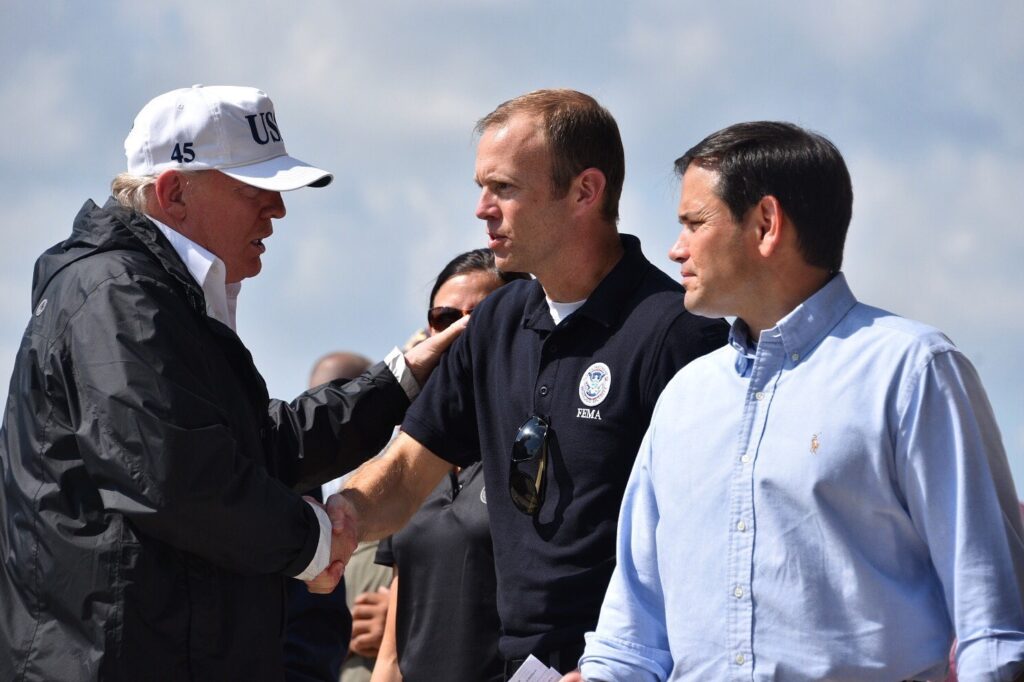
President Donald Trump greets FEMA Administrator Brock Long and Sen. Marco Rubio shortly after arriving in Ft. Meyers, Fla., Sept. 14, 2017 (Photo: U.S. Coast Guard)
While Tillerson had no political aspirations beyond his tenure in the cabinet, Pompeo clearly did and Rubio certainly does. He might even challenge J.D. Vance for rising star status.
Though there are likely to be some tensions that will erupt between Trump and Rubio, given the dominance that Trump currently has over the Republican party, we might expect Rubio to hitch his wagon to Trump world. Once in place and in charge of international negotiations, his differences in position might become a little clearer.![]()
This article is republished from The Conversation under a Creative Commons license. Read the original article.

